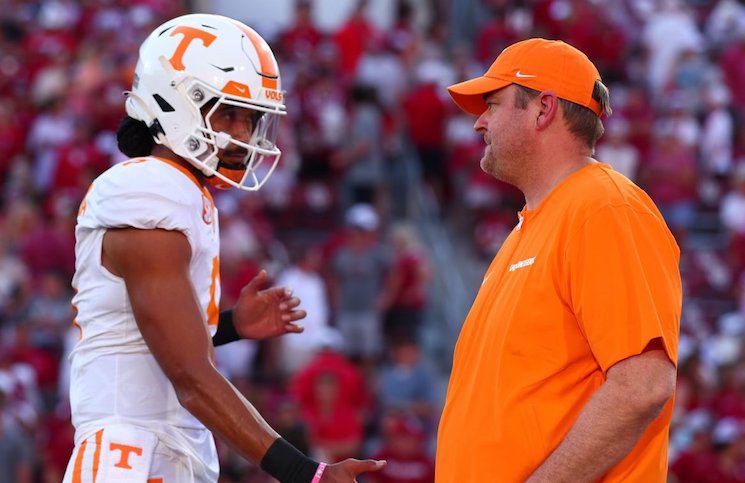
Josh Heupel’s Subtle Criticism of Nico Iamaleava: A Deep Dive into the Vols Quarterback Situation
In the world of college football, coaching changes, player development, and quarterback battles often take center stage. The University of Tennessee, home to a passionate fan base and a rich football history, has been no stranger to the spotlight, especially when it comes to its quarterback play. Josh Heupel, the head coach of the Tennessee Volunteers, has had his fair share of success and challenges in his tenure. The program, which Heupel took over in 2021, has been on the rise, and his offensive philosophy has breathed new life into a once-stagnant team.
However, in a recent interaction that turned heads, Josh Heupel subtly criticized former Vols quarterback Nico Iamaleava, raising questions about the development of the young QB. Iamaleava, a highly-touted recruit, was seen as the future of the program. However, Heupel’s comments cast a shadow of doubt on Iamaleava’s time at Tennessee, leading to speculation about what went wrong and what this means for the future of the Vols’ quarterback situation.
The Rise of Nico Iamaleava
Nico Iamaleava was a quarterback who turned heads long before he ever set foot on the Tennessee campus. A five-star recruit, Iamaleava was one of the top quarterbacks in the country and was expected to make an immediate impact for the Volunteers. His arm strength, mobility, and leadership qualities were often highlighted as reasons why he was such a coveted prospect. Many expected him to be the next great quarterback at Tennessee, potentially leading the Vols back to championship contention.
Heupel, known for his high-powered offense and ability to develop quarterbacks, seemed like the ideal coach to unlock Iamaleava’s potential. With a history of success with quarterbacks like Dillon Gabriel at UCF, Heupel was poised to bring out the best in Iamaleava. The future seemed bright, but things didn’t go according to plan.
Iamaleava, who had a stellar high school career, faced challenges transitioning to college football. The speed of the game, the complexity of Heupel’s offense, and the pressures of being a highly-ranked recruit all played a role in his struggles. Despite flashes of brilliance, Iamaleava failed to fully secure the starting role during his time at Tennessee, and by the time he left the program, there were lingering questions about his development under Heupel’s tutelage.
Josh Heupel’s Comments: A Subtle Criticism
Josh Heupel’s comments regarding Iamaleava were far from overt or direct. Heupel, known for being a relatively calm and measured figure in the media, didn’t explicitly criticize his former quarterback. However, his words, when closely examined, seemed to cast a shadow over Iamaleava’s time at Tennessee.
Heupel, when discussing his quarterbacks, emphasized the importance of growth and development, particularly in the context of young players. He noted that developing a quarterback wasn’t just about raw talent or arm strength but about maturity, decision-making, and the ability to handle the pressure of being the face of a college football program. These comments were seen as a subtle dig at Iamaleava’s inability to live up to the lofty expectations placed on him when he arrived in Knoxville.
Moreover, Heupel alluded to the importance of work ethic and preparation, underscoring how crucial it was for quarterbacks to fully understand the nuances of an offensive system. While Heupel did not name Iamaleava directly, his comments seemed to imply that Iamaleava had not fully grasped or adapted to the demands of Tennessee’s system. For a coach like Heupel, who thrives on up-tempo, high-efficiency offenses, any hesitation or lack of preparation from a quarterback would stand out, particularly in a program where expectations are high.
The Reality of Quarterback Development
Quarterback development is a nuanced and often misunderstood aspect of college football. While a player like Iamaleava may have had all the physical tools to succeed, the reality is that transitioning from high school to college football is a massive jump. The level of competition increases dramatically, the playbook expands, and the pressure to perform from day one can be overwhelming.
For a quarterback in Heupel’s system, the learning curve is steep. Heupel’s offense is known for being fast-paced, requiring quarterbacks to make quick decisions and execute at a high level under pressure. The system demands not just a strong arm but also a sharp football IQ, the ability to read defenses quickly, and the composure to stay calm under the intense scrutiny that comes with playing in the SEC.
Iamaleava, despite his tremendous talent, struggled to adjust to these demands. Many players, even the most talented, take time to adapt. Quarterbacks, in particular, are often judged not just on their talent but on their ability to execute a complex offensive scheme, read defenses, and make quick decisions in high-pressure situations. Iamaleava’s inability to consistently do this under Heupel’s system may have led to his struggles at Tennessee.
Moreover, the quarterback position is often a reflection of the team’s overall dynamics. Heupel’s offense thrives on having a quarterback who can execute quickly and efficiently, but it also relies on a solid supporting cast of receivers, offensive linemen, and running backs. If any part of the offense fails to click, it can impact the quarterback’s performance. Iamaleava was thrust into a high-pressure situation with the expectation that he would turn the program around. This might have been an unrealistic expectation, especially given the rebuilding nature of the team during his tenure.
The Fallout and Speculation
While Heupel’s comments may have been subtle, the fallout from them has been significant. Fans and analysts alike have begun to scrutinize the quarterback position at Tennessee, wondering what went wrong with Iamaleava’s development. Many expected the young quarterback to be the face of the program, but his inability to thrive in Heupel’s system has raised doubts.
The criticism has sparked speculation about what could have been different. Was Heupel too hard on Iamaleava? Did the offensive system not suit his skill set? Or was Iamaleava simply not ready for the demands of college football, despite his immense talent? These questions have fueled discussions among fans and media members, with some questioning whether Tennessee’s quarterback development strategy is flawed.
Additionally, the timing of Heupel’s comments has led to further speculation. With the transfer portal becoming an increasingly influential factor in college football, Iamaleava’s departure from Tennessee raised eyebrows. Some suggested that Heupel’s comments were aimed at explaining the departure of a talented quarterback who failed to live up to expectations. Others speculated that Heupel’s criticism was a way to temper any backlash and shift the blame onto Iamaleava for not fully developing under his watch.
The Future of Tennessee’s Quarterback Situation
Despite the drama surrounding Iamaleava, Tennessee’s quarterback situation remains fluid. Heupel’s offense is designed to make quarterbacks successful, and the Volunteers are still a program on the rise. The future of Tennessee football, as it pertains to the quarterback position, will largely depend on how Heupel adapts his system to the strengths of his future quarterbacks and how he continues to develop talent.
If there’s one thing that is clear from Heupel’s tenure so far, it’s that he knows how to find success with quarterbacks. The emergence of Hendon Hooker as a star under Heupel’s system is proof that Heupel can develop quarterbacks who thrive in his fast-paced, high-efficiency offense. If Heupel can find a quarterback who fits his system, the Vols could be in for a bright future.
For now, the subtle criticism of Iamaleava serves as a reminder of the challenges that come with developing quarterbacks. Heupel’s offense requires more than just physical talent—it requires mental sharpness, maturity, and the ability to handle pressure. While Iamaleava’s time at Tennessee may not have lived up to the lofty expectations set for him, it serves as a lesson in the complexities of quarterback development and the realities of coaching in college football.
Josh Heupel’s subtle criticism of Nico Iamaleava may have caught many by surprise, but it also sheds light on the challenges that come with developing young quarterbacks in college football. While Iamaleava’s time at Tennessee didn’t live up to expectations, it’s important to remember that quarterback development is a process. It’s a complex and sometimes unpredictable journey that requires patience, adaptation, and resilience.
The future of Tennessee football will depend on how Heupel continues to develop his quarterbacks and whether he can find the right fit for his system. As for Nico Iamaleava, his time at Tennessee may not have gone as planned, but his journey is far from over. With his immense talent and the right guidance, he may still find success in his future endeavors, whether in college football or beyond.





